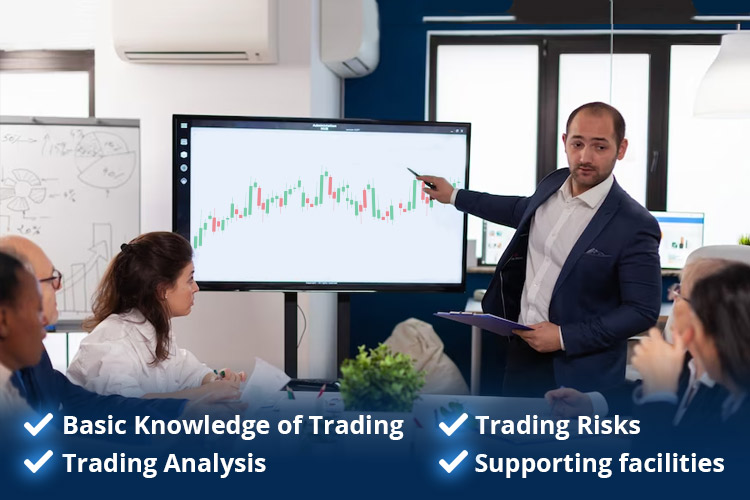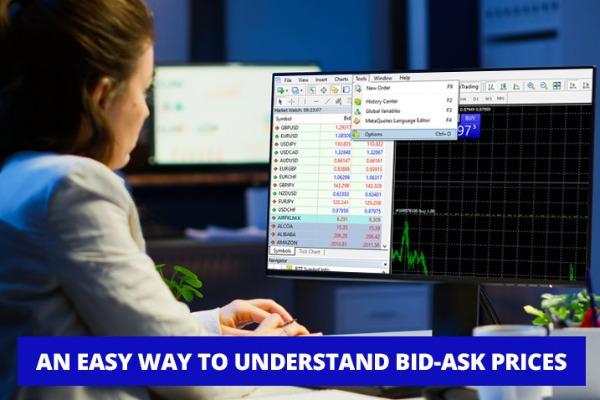Traders should be cautious when choosing a trading course to avoid scams. Spot a legit trading course from a fake one by looking at the following 4 signs.

Trading courses have gained popularity among traders, especially beginners. Trading courses enable traders to learn directly with trading mentors who are mostly professional traders and have experience for years. Additionally, trading courses provide comprehensive learning materials and superior facilities compared to self-study methods.
It's important to note that trading courses can't guarantee trading success, but they could enhance your understanding of forex trading. However, choosing a trading course is not a simple thing since there are many scams claiming to be trading courses. To prevent trading course scams, you should check various aspects such as legality, credibility, reputation, and the price offered.
If you're considering taking a trading course, it's important to be able to spot the scams. Here are 4 signs of legit trading courses:
- Provides basic knowledge of Forex Trading
- Reveal forex trading risks
- Explains forex trading analysis
- Provides trading facilities
If you can find a trading course that meets all of these criteria, then it's likely to be a legit course. However, if you want more specific information about the 4 points above, check out the explanation below.
1. Provides Basic Knowledge of Forex Trading
A legit trading course should start by providing basic education about forex trading. This includes important concepts like margin, bid/ask, rollover, forex markets, brokers, forex pairs, and more. Understanding these basics is crucial to prevent traders from making wrong transaction decisions. It also helps traders gain valuable insights into the market and enables them to use suitable strategies for profitable trading.
On the opposite, fake trading courses lack the basic knowledge you need. Instead of teaching the realities of trading, they intentionally raise the expectations of beginners and make them feel overly optimistic. Usually, they make promises of instant wealth and huge profits, but in fact, consistent profits in forex trading require extensive learning.
2. Reveal Forex Trading Risks
Forex trading, like any other investment, involves significant risks, following the "High Risk, High Return" principle. Unfortunately, many beginner traders are unaware of the risks involved when they start trading. Fake trading courses never address these risks.
Fraudulent individuals offering investment schemes often use promises of high returns to attract potential victims. Then, they set up an attractive bait to catch their unwary victims. That's why they don't reveal the risks.
Therefore, understanding and evaluating the risks can be your benchmark when choosing a trading course. Realizing all the risks beforehand will make you more aware and cautious, and prevent you from making silly mistakes. It'll also train you to find the best solutions to problems that may appear in the future.
3. Explains Forex Trading Analysis
Fundamental and technical analysis are the two main pillars of forex trading. These two types of analysis are the best approaches for you to gain profit from forex trading.
- Fundamental analysis is a top-down approach that looks at the overall economic health of a country or region to predict the future direction of its currency. It uses economic data such as GDP, inflation, interest rates, and employment to assess the strength or weakness of an economy.
- Technical analysis is a bottom-up approach that looks at the historical price movements of a currency pair to identify patterns and trends that can be used to predict future price movements. It uses tools such as charts, indicators, and oscillators to analyze price action.
By mastering both fundamental and technical analysis, you can make more informed trading decisions and increase your chances of success. You can also determine the accurate entry and exit points. This will increase your profit opportunities. Fake trading courses won't provide this kind of knowledge because basically, they only need your money, not to help you succeed.
4. Provides Trading Facilities
Forex trading is a complex and risky activity that requires a high level of skill and knowledge. It is important for traders to have access to the necessary trading facilities in order to develop their skills and find a reliable trading system.
Here are some examples of trading support facilities that are commonly offered by professional trading courses:
- Live conference room: A dedicated space where you can practice trading in real-time.
- Guidance from a trading mentor: Direct supervision and feedback from an experienced mentor who can assist you when facing challenges.
- Online accessibility: Access to educational resources such as videos, webinars, and ebooks that can be conveniently accessed anytime and anywhere.
- Interactive discussion forums: Platforms where you can engage with other traders, exchanging ideas and insights.
In addition to these physical facilities, professional trading courses also cover non-physical facilities such as:
- Money management: This is the process of managing risk and maximizing profits. It is an essential skill for all traders.
- Trading psychology: This is the study of the mental factors that affect trading performance. It is important for traders to understand how their emotions can impact their trading decisions.
Dangers of Trading Scams
Trading scams are a serious problem that can cost you money, time, and even your personal data safety. Vulnerable traders can be a good target for scammers to exploit and bleed the victim's bank account.
In addition to material harm, scam trading cases can also target the victim's personal identity. Some scammers often ask for users' personal and important data. They said the data was needed for administrative files. The requested data includes ID card, family card, account number, email, phone number, etc.
If the victim does not realize the importance of personal data, this can be very detrimental. The reason is that personal data can be used by scammers for phishing, loan applications, etc.
Scammers tend to use different tactics and modes to attract potential victims. However, although they use various modes, we can basically identify a scam's characteristics from these 3 aspects.
- High-pressure sales tactics. Scammers often use high-pressure sales tactics to pressure you into making a decision quickly. They may promise you unrealistic returns or make claims that seem too good to be true.
- Excessive fees. Legitimate trading courses typically charge a nominal fee for registration. If you're asked to pay a large sum of money upfront, it's a red flag.
- Requests for personal information. Scammers may ask for your personal information, such as your name, address, and phone number. They may also ask for your bank account information or credit card number. Never give out this information to someone you don't know and trust.
See Also:
Bottom Line
Learning forex trading is not a quick fix. It takes patience and perseverance to be successful and consistently profitable. A legitimate trading course will cover four aspects including, providing basic knowledge to traders, revealing forex trading risks, explaining various analyses, and offering a wide range of trading support facilities.
Fake trading courses may promise quick profits or easy money, but they are often scams. Don't fall for false promises and unrealistic expectations. Forex trading is a complex and risky endeavor, and it takes time, effort, and dedication to be successful.
If you are serious about learning forex trading, do your research and choose a reputable course. There are many resources available online and in libraries that can help you get started. You can also find a mentor or coach who can help you learn the ropes.
Apart from trading courses, we can learn a lot from educational articles about forex trading from various sites. BrokerXplorer has a dedicated section for educational articles which can be adjusted according to your knowledge level.

 Dedicated FREE FOREX VPS
Dedicated FREE FOREX VPS Free FOREX Virtual Private Server
Free FOREX Virtual Private Server MT4 Demo Contest, Get $500
MT4 Demo Contest, Get $500 Sign Up for an Account, Claim 60% Deposit Bonus
Sign Up for an Account, Claim 60% Deposit Bonus Free MT4/MT5 VPS 2024
Free MT4/MT5 VPS 2024 Send E-mail and Get Free Merchandise
Send E-mail and Get Free Merchandise $1K Refer a Friend Bonus for Pepperstone Pro clients
$1K Refer a Friend Bonus for Pepperstone Pro clients Maximize Your Earnings with 100% Deposit bonus
Maximize Your Earnings with 100% Deposit bonus Trade to Win, $5,000 Monthly Demo Contest
Trade to Win, $5,000 Monthly Demo Contest Claim 30% + 15% Deposit Bonus from LiteFinance
Claim 30% + 15% Deposit Bonus from LiteFinance











